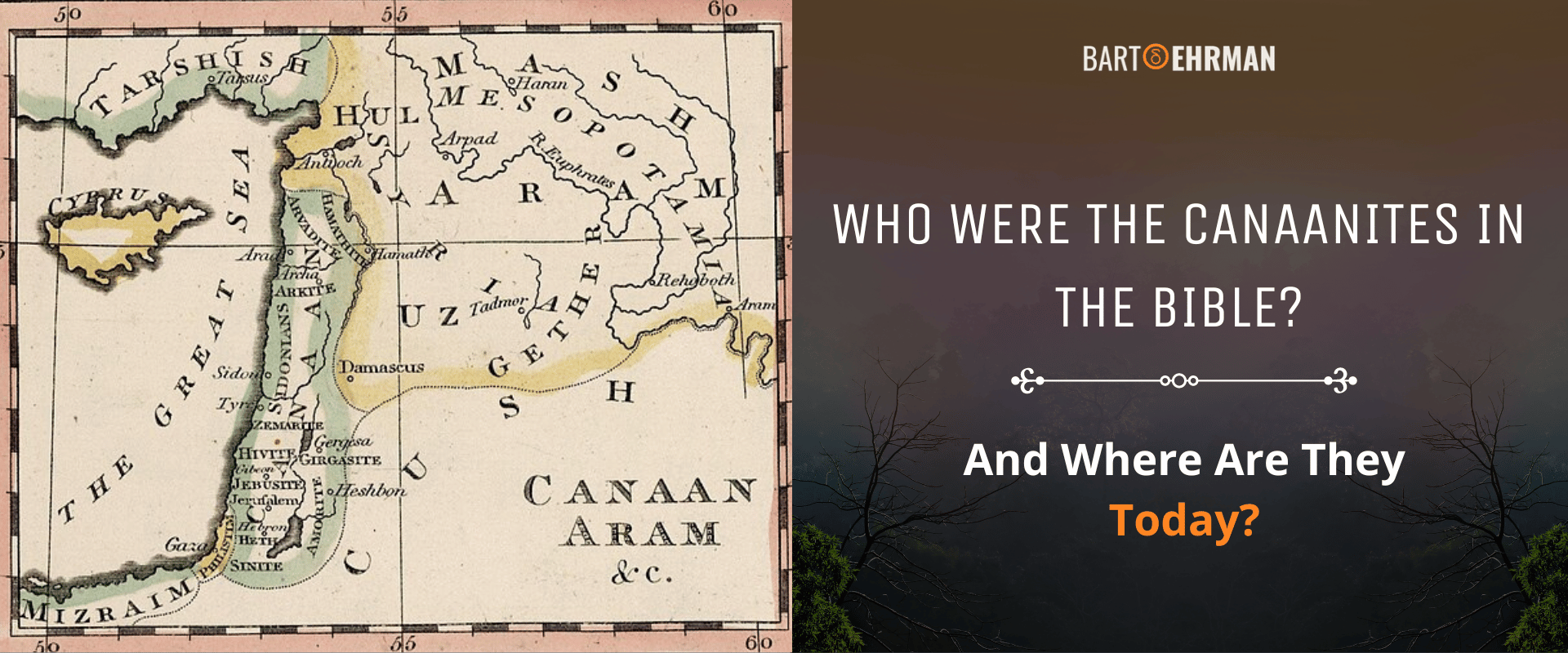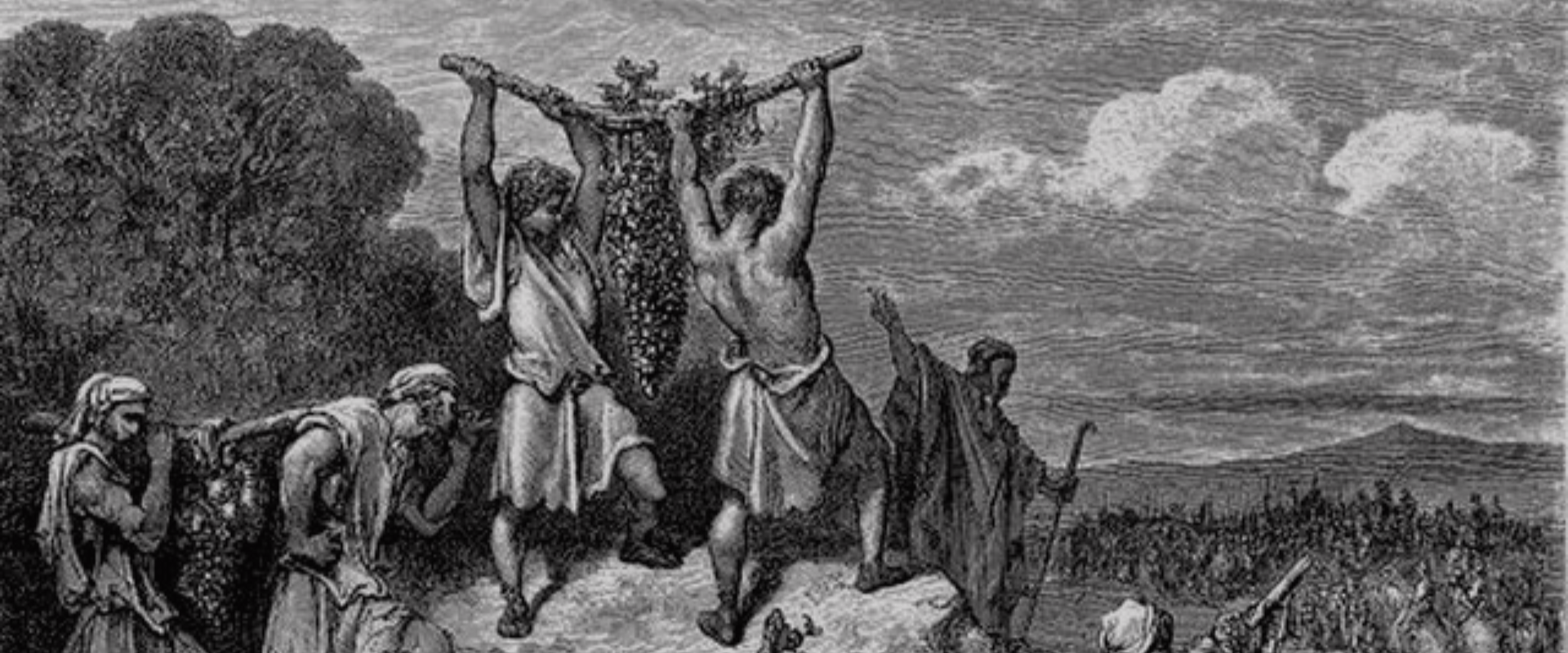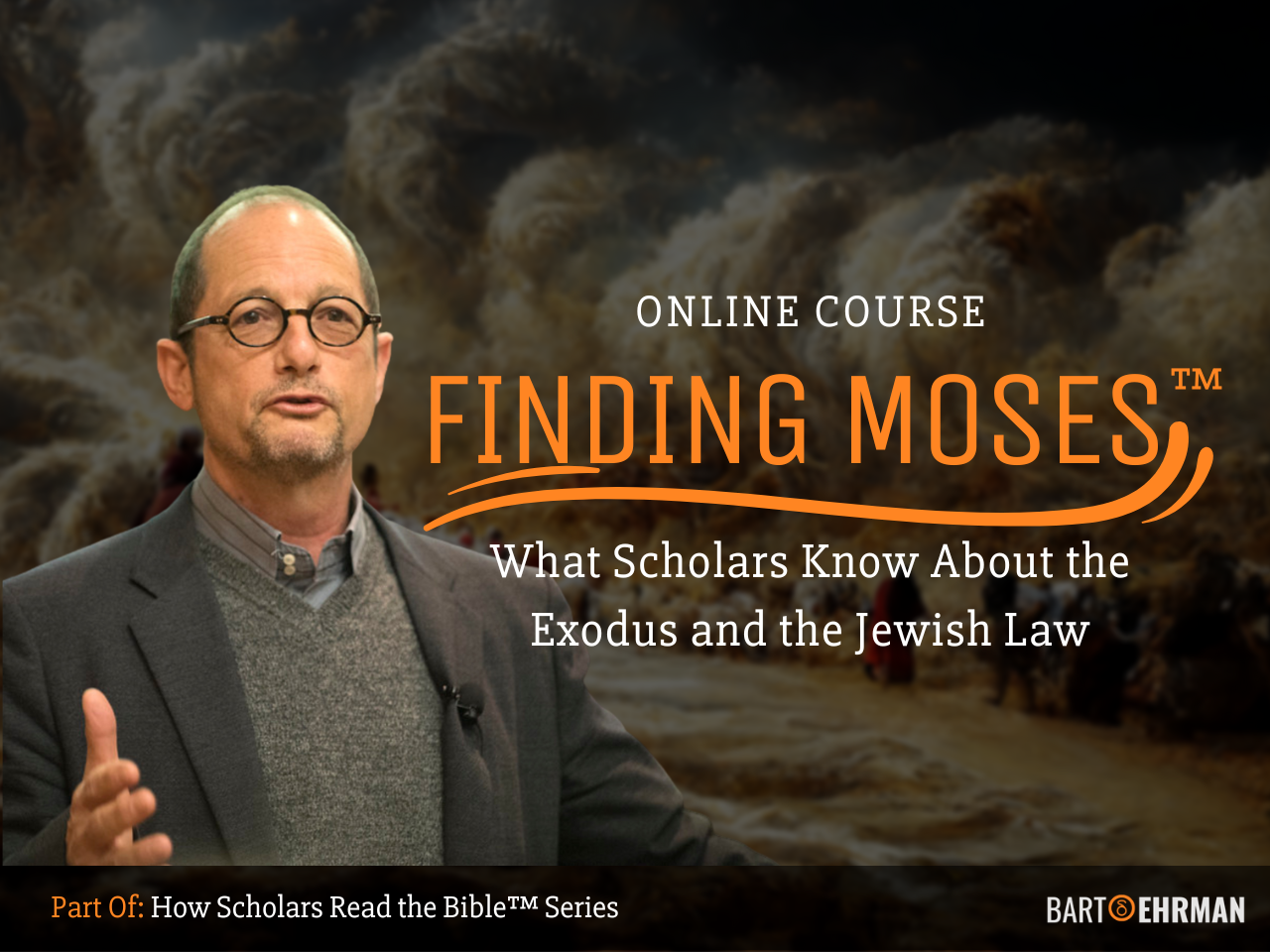Who Were the Canaanites in the Bible? (And Where Are They Today?)

Written by Marko Marina, Ph.D.
Author | Historian | BE Contributor
Verified! See our guidelines
Verified! See our editorial guidelines
Date written: May 6th, 2024
Disclaimer: The views and opinions expressed in this article belong to the author and do not necessarily match my own. - Dr. Bart D. Ehrman
During my undergraduate years, while delving deep into the annals of history, I also embarked on a philosophical quest, exploring various viewpoints on the existence of God. This journey introduced me to prominent atheistic thinkers from Friedrich Nietzsche to Richard Dawkins.
Reading Dawkins, in particular, I encountered the troubling biblical account of the Israelites' slaughter of the Canaanites, a story Dawkins uses to argue that sacred texts, especially the Bible, can’t serve as moral compasses. This confrontation with the harsh narratives of ancient scriptures was disconcerting but also piqued my curiosity about the historical and cultural contexts of these stories.
The tale of the Canaanites isn’t just a footnote in religious texts; it opens up broader discussions about their history, ethnicity, and importance within the Jewish tradition. So, who were the Canaanites?
In this article, we look at the biblical account of the Canaanites and the findings of contemporary scholarship. Beyond that, we’ll explore who the Canaanites are today thus probing into the realm of genetic research.
By examining who the Canaanites are in the Bible and what discoveries archeologists and other scholars have made, we attempt to bridge the gap between ancient texts and contemporary findings and make these discussions accessible to a broader lay audience interested in the historical foundations of one of the most influential books of all time.
But before we begin our exploration into the Canaanite people, I encourage you to deepen your understanding of the historical contexts surrounding these ancient narratives through Bart D. Ehrman’s online course, “Finding Moses — What Scholars Know About The Exodus and The Jewish Law”. This course features eight 30-minute lectures addressing critical questions like “Was Moses a historical figure or are the stories about him completely legendary?” and “Exodus — fact or fiction? What does the evidence say?” Enroll now to unravel these fascinating inquiries alongside a renowned scholar.

Where is Canaan Today? Geography and History
Where did the Canaanites live? The Land of Canaan holds a geography rich with historical significance and strategic value. Encompassing modern-day regions including Israel, Palestine, Lebanon, and parts of Syria and Jordan, Canaan was a melting pot of cultures and a vital bridge between Africa and Eurasia.
To be more precise, scholars today use Canaan as a geopolitical entity corresponding to the modern states of Israel, the West Bank/Gaza Strip, Jordan, Lebanon, and southern Syria.
Its boundaries, although not static through the ages, generally spanned from the Sinai Peninsula in the south to the Lebanon Mountains in the north, and from the Mediterranean Sea in the west to the Jordan River and the deserts beyond in the east.
This area wasn’t only fertile, making it ideal for ancient agriculture, it was also a critical corridor for trade routes connecting ancient Egypt with Mesopotamia, facilitating the exchange of goods, ideas, and innovations.
Canaan’s role as a crossroads for various ancient civilizations made it a region of immense cultural and economic activity and continual conflict and conquest. The strategic value of the land brought many external powers to its doorsteps, including the Egyptians, Hittites, and later the Assyrians and Babylonians.
As we transition from geographical information, we now turn to explore how this land and its people are portrayed in the Hebrew Bible thus shedding light on their roles and relationships within these sacred texts.
Canaanites in the Hebrew Bible: The Archenemy of Israel
Who were the Canaanites in the Bible? The Canaanites, mentioned around 160 times in the Hebrew Bible, occupy a prominent and often controversial place within these sacred texts. In the biblical narrative, Canaan and the Canaanites represent not only a geographical entity but also a complex theological challenge and moral dilemma for the Israelites.
The Hebrew Bible portrays the Canaanites as the original inhabitants of the Promised Land - a land promised by God to the Israelites. This promise is found in texts such as Genesis 12:6-7, where God tells Abram, "To your offspring I will give this land."
After the Israelites' flight from Egypt led by Moses and highlighted by the miraculous parting of the Red Sea, the narrative describes a series of wars against the Canaanites and other groups. This military campaign, aimed at the conquest of Canaan, culminates in some texts in the destruction of Canaanite cities and the extermination of their inhabitants.
The story of the conquest of Jericho as recounted in the Book of Joshua is one of the most vivid and dramatic examples of the Israelite campaigns against the Canaanites. According to Joshua 6, the Israelites encircled the city for six days and on the seventh day, marched around the city seven times.
With trumpet blasts and the shouting of the people, the city walls miraculously fell, leading to the destruction of Jericho and the extermination of all its inhabitants - men, women, children, and even animals. The account of Jericho’s fall, however, raises profound historical and ethical questions about the narratives of conquest and extermination in the Hebrew Bible.
John J. Collins provides a critical perspective on this, noting: “The story of the capture of Jericho is almost certainly fictitious, but this doesn’t lessen the savagery of the story. We are not dealing in Joshua with a factual report of the ways of ancient warfare. Rather, the slaughter of the Canaanites, here and elsewhere, is presented as a theologically correct ideal."
Some evangelical commentators, on the other hand, have argued that the harsh treatment of the Canaanites was a divine response to abhorrent practices, portraying it as a form of divine justice or purification. However, the problem is deeper than the supposed evil Canaanites' practices.
The brutality of warfare in antiquity is no greater than in modern times and arguably less. We shouldn’t be surprised that the Israelites, like other peoples, gloried in the destruction of their adversaries. What is troubling, as John J. Collins observes, in the Biblical text is the claim that such action is justified by divine command and therefore praiseworthy.
Furthermore, Niels P. Lemche notes that while studies of the Canaanite religion by the Old Testament scholars have enhanced our understanding of this ancient Near Eastern religion, the presence of anti-Canaanite passages in the Hebrew Bible may have also obscured a true comprehension of Canaanite civilization.
Lemche's observation underscores the challenge of separating historical fact from theological narrative, and it sets the stage for a deeper exploration of the Canaanites through contemporary archaeological and scholarly insights.
Who Were the Canaanites? Contemporary Scholarship
The historicity of the biblical narratives concerning Canaan and the Canaanites has been increasingly called into question by archaeological and textual findings. These discoveries suggest a different story from the biblical account of the Israelites' conquest of Canaan after wandering in the wilderness for forty years.
Did You Know?
Archaeological evidence, along with textual analysis of ancient scriptures, suggests that early Israelite religion wasn’t strictly monotheistic but involved the worship of multiple deities. In the earliest periods of their history, the Israelites shared many religious practices and beliefs of the Canaanite culture they belonged to. This included the worship of a pantheon of gods (e.g. the god El).
The transition from polytheism to monotheism in the Israelite religion was gradual. Over time, the religious focus shifted towards an exclusive worship of Yahweh, the God of Israel. This shift is evident in later biblical texts, which emphasize the singular worship of Yahweh and explicitly reject the worship of other gods, but never deny their existence!
Ann E. Killebrew presents a compelling perspective on the emergence of ancient Israel, suggesting it as a process of ethnogenesis - a gradual development of a distinct group identity from a "mixed multitude" of peoples (including the Canaanites) primarily indigenous to the region.
According to Killebrew, this process "can only be understood in the wider eastern Mediterranean context” that didn’t recognize clear identity boundaries between different groups of people living in that area.
This nuanced view contrasts sharply with the biblical narrative found in the Book of Joshua, which describes the Israelites (one monolithic ethnic group) entering the promised land and conquering the Canaanites (the other monolithic ethnic group). Most scholars now agree that the account depicted in Joshua is of limited historical value and likely reflects much later historical periods.
The archaeological evidence supports this reevaluation. Early Israelite villages show a continuity of material culture with that of the Canaanites, indicating that these groups were not distinct but rather part of a continuous cultural and social milieu.
Dr. Ronald Hendel, in a recent controversial movie, highlighted this connection by noting that Hebrew is a Canaanite language and that early writings from the Hebrew Bible show clear continuities with older Canaanite literature.
The apparent lack of a clear demarcation line between these two "nations" reflects a more fluid understanding of identity in the ancient world that starkly differs from today's conception of nation-states and national identities.
In terms of religion, the Canaanites worshipped a pantheon of gods, which underscores the cultural continuities within the region. Key among these deities was El, the supreme god of the Canaanite religion.
Ronald Hendel notes the overwhelming existence of evidence suggesting that El was the chief deity for various local Canaanite pantheons including those of Israel. After all, as he observes, the name “Israel” itself originally meant something like “El rules”.
Furthermore, John J. Collins notes that the most striking feature of Canaanite mythology is “the violence of the goddess Anat, who not only dismembers Death but also berates the high god El on occasion and threatens to smash his skull if he doesn’t comply with her wishes.”
Canaanites’ gods and their associated rituals and myths appear in various forms within the broader context of Levantine mythology which indicates shared religious traditions across what are now considered separate cultural groups.
So, who were the Canaanites? They weren’t a unified ethnic group with a monolithic ancestry or beliefs. Instead, both the writings and archaeological findings suggest that they were a diverse mix of native people and newcomers living in what today is the states of Israel, the West Bank/Gaza Strip, Jordan, Lebanon, and southern Syria. Their connections were primarily based on local politics and economics, tied to individual city-states rather than a single national identity.
Who are the Canaanites Today?
Modern theories about ethnic identity challenge the simplistic idea of directly linking contemporary ethnic groups to ancient peoples. For example, many Europeans today claim descent from ancient groups like the Celts, Franks, or Goths, but as historian Patrick Geary points out, the notion that a national character is permanently fixed in the distant past isn’t valid at all.
This concept largely emerged with the rise of national identities during the 18th and 19th centuries and served the cause of modern nation-states who had to anchor their ethnic existence in the distant past.
Similarly, attempting to directly trace the identity of modern-day groups back to the ancient Canaanites oversimplifies a much more complex process. Essentially, if we were to search for direct descendants of the Canaanites today, we would likely be disappointed.
Over centuries, identities evolve and change, moving away from the outdated idea of primordialism which viewed ethnic identities as fixed and unchanging.
This leads us to consider how modern groups have formed, emphasizing that the development of any contemporary group is a lengthy process that started in antiquity and continues today. It's a dynamic process that constantly evolves, shaped by the interactions of both the elite and ordinary people. Ethnicity, therefore, is seen as a social construct, continuously molded over time.
So, who are the Canaanites today? There is no straightforward answer. But if one were to look for genetic traces of the Canaanites, a notable study by Marc Haber, Chris Tyler-Smith, and their team at The Wellcome Trust Sanger Institute in the United Kingdom provides some answers.
They sequenced the complete genomes of five Canaanite individuals who lived about 4000 years ago and concluded, "The present-day Lebanese are likely to be direct descendants of the Canaanites, but they have in addition a small proportion of Eurasian ancestry that may have arrived via conquests by distant populations such as the Assyrians, Persians, or Macedonians.
Their research would suggest that Lebanese are the modern-day Canaanites but in light of the complexities behind the formation of ethnic identity, we should be careful not to make any direct correlation.
In that aspect, it's important to recognize that genes don’t define ethnic identity. While the current population of Lebanon does show genetic ties to the ancient Canaanites, the ethnic identity of Lebanese people results from a far more intricate process involving various cultural, social, and other factors.
To state plainly, the Lebanese aren’t modern-day Canaanites. Such a statement would oversimplify the complex formation of ethnic identities by reducing it to merely biological terms - a perspective that is not only scientifically flawed but also potentially harmful, as recent history has demonstrated.
As Lauren Winter writes: “Manipulating ethnic definitions through the use of science can have very real social, political, and economic consequences.”

Summing up Conclusion
Who are the Canaanites? In summing up our exploration of the Canaanites, both in biblical texts and through the lens of contemporary scholarship, we find a narrative deeply intertwined with the complexities of ancient history and modern interpretation.
The Canaanites, as depicted in the Hebrew Bible, emerge not only as theological adversaries but also as people whose real historical context is often overshadowed by the narratives imposed upon them.
Contemporary archaeological studies suggest a close relation between the early Israelites and Canaanites emphasizing the notion that they were a part of the same culture. To put it more bluntly, early Israelites were a Canaanite people. The parting of the ways happened later through a gradual process of identity formation.
Moreover, genetic studies suggest a “continuity” between the Canaanites and modern populations in the Middle East, particularly the Lebanese, yet the studies of ethnic identities by historians, sociologists, and anthropologists caution against simplifying these connections into direct ethnic lineages.
The quest to define "Who were the Canaanites?" or “Who are the Canaanites today?” often reveals more about our biases in studying the past than about the Canaanites themselves.
It challenges us to reconsider how we conceive of ethnicity and history, reminding us that the past is not just a series of events to be recounted but a complex tapestry of human experience, continually interpreted and reinterpreted through various lenses.

